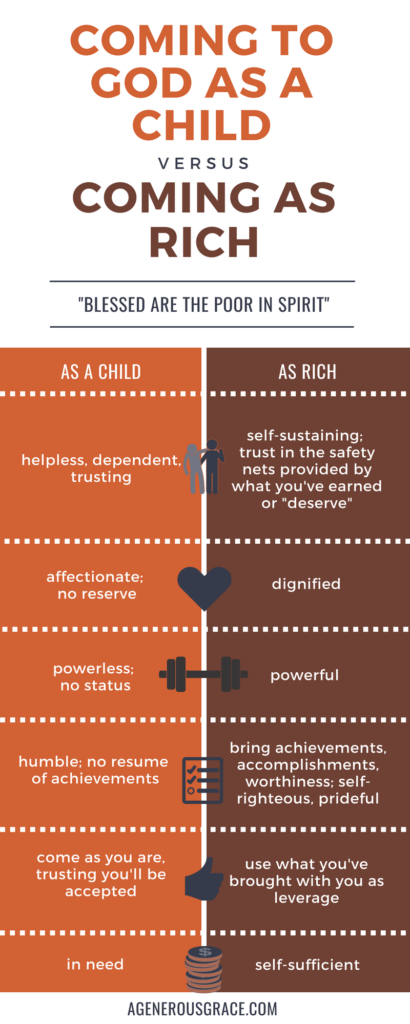The other night after small group, I experienced the cutest thing all week: The daughter of one of our members—who, when she wears pigtails, reminds me of a blonde, blue-eyed version of Boo from Monsters Inc. Our host home had The Most Patient Cat in the World, who allowed Boo to exclaim in her sweet little voice over all of his main body parts, touching as she went: “TAIL!” “EYES!” “FACE!” about 546 times. We watched said cat for an entire half hour.
She was disarming, delightful, and chock-full of sheer happiness. She was adorably undignified, openly affectionate.
I’ve been thinking about how God wants us to come to him like Boo—no. Actually, requires we come somehow like her.
What Not to Do
A pastor pointed out to me recently that in Mark 10, there may be a distinct logic behind the ordering of the stories there. Jesus is “indignant” with his disciples, who kept kids from coming to him. Kids were people of no status; nothing to contribute to society except a mouth to feed. Yet Jesus throws everybody off with his black-and-white comment: Truly, I say to you, whoever does not receive the kingdom of God like a child shall not enter it (v. 15).
But the next story is of a rich, young ruler. He’s seeking Jesus genuinely; he’s said to run up and kneel at this peasant’s feet, utterly beneath his status. He wants to know what to do to gain eternal life.
So Jesus isolates the one thing the guy can’t let go of: his wealth, and presumably all the standing and favor it affords him. As the man walks away in sorrow, Jesus remarks, “It is easier for a camel to go through the eye of a needle than for a rich person to enter the kingdom of God…With man it is impossible, but not with God. For all things are possible with God” (v. 25, 27).
Does God Have Something Against Rich People?
Both living in Africa and returning to the U.S., I’ve marveled over God’s strong words against the rich. I realize now that simply being college-educated puts me in the top 6.7% of the world’s population. Plus my family owns two cars. What percentage does that put me in? If 80% of the world lives in poverty, there is no doubt I’m rich. (See this post by my friend Kristen: Your Normal Isn’t The World’s Normal And The Greatest Deception Is That You Believe It Is.)
I see rich people loved by God in the Bible, like Abraham. Job. David. But what is it about wealth that makes loving God unlikely? And why does he contrast this with…kids? Surely these two stories have tremendous significance to us here in the West.
Tim Keller speaks in his insightful podcast “Blessed are the Poor” about being “poor in spirit”, which I’ve been gnawing on this week. I found his similar sentiments in this article:
[Poor in spirit] means seeing that you are deeply in debt before God, and you have no ability to even begin to redeem yourself. God’s free generosity to you, at infinite cost to him, was the only thing that saved you.
But then, Keller writes about the opposite: being “middle class” in spirit.
You believe that God owes you some things—he ought to answer your prayers and to bless you for the many good things you’ve done. Even though the Bible doesn’t use the term, by inference we can say that you are “middle-class in spirit.” You feel that you’ve earned a certain standing with God through your hard work. You also may believe that the success and the resources you have are primarily due to your own industry and energy.
IOU?
I gathered a sense of subtle entitlement even serving in Africa. As if doing something sacrificial for God earned me better standing, a right to be heard and answered as I wished. I wasn’t coming to him needing Jesus’ merits; I brought my own.
Contrast this with kids like Boo. What would a kid bring to God?
People might suggest it’s kids’ innocence or purity that we want to pursue. But, um, I have kids. They don’t really have either one. (Kids don’t have to be taught to disobey, that’s for sure.)
I’ve spent some time thinking on it this week, with Sunday’s guidance from my pastor-friend. Based on other Scriptures, too, here’s what I’ve come up with. I’d love your thoughts on it.
Like this post? You might like
- Freebie Fridays: Practical Tips on Humility from a Dead Bishop [INFOGRAPHIC]
- Guest Post: Are We Raising Spiritually Entitled Kids?
- Look What I Did! On an Illusion of Spiritual Achievement
- 14 Great Paradoxes of Jesus’ Death [printable INFOGRAPHIC]













![Now You're Speaking My [Love] Language Now You're Speaking My [Love] Language](https://www.janelbreitenstein.com/wp-content/uploads/2015/08/love-languages-text-1.jpg)





Leave a Reply